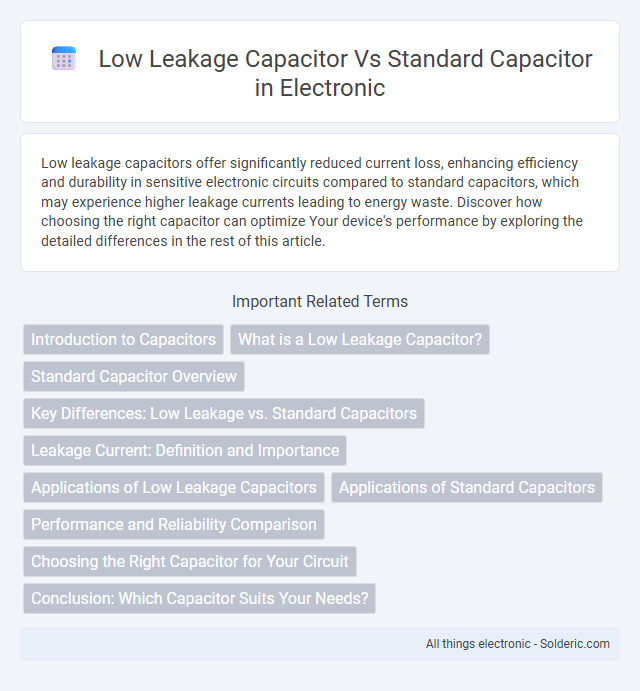Low leakage capacitors offer significantly reduced current loss, enhancing efficiency and durability in sensitive electronic circuits compared to standard capacitors, which may experience higher leakage currents leading to energy waste. Discover how choosing the right capacitor can optimize Your device's performance by exploring the detailed differences in the rest of this article.
Comparison Table
| Feature | Low Leakage Capacitor | Standard Capacitor |
|---|---|---|
| Leakage Current | Very Low (nanoampere range) | Higher (microampere range) |
| Dielectric Material | High purity materials (e.g., polypropylene, ceramic) | Common materials (e.g., electrolytic, ceramic) |
| Applications | Precision circuits, medical devices, low-power electronics | General purpose electronics, power supplies |
| Cost | Higher due to specialized materials and manufacturing | Lower, mass-produced |
| Stability | High stability over temperature and time | Moderate stability |
| Operating Voltage | Typically lower or moderate voltage ratings | Wide voltage range options |
Introduction to Capacitors
Low leakage capacitors are designed to minimize current loss due to dielectric imperfections, making them ideal for precision circuits requiring consistent performance over time. Standard capacitors, while suitable for general applications, exhibit higher leakage currents that can affect circuit stability and energy efficiency. Choosing the right capacitor for Your design depends on the specific leakage tolerance and reliability needed in the electronic system.
What is a Low Leakage Capacitor?
A low leakage capacitor is designed to minimize the amount of current that leaks through the dielectric, thus enhancing performance in sensitive electronic circuits. Unlike standard capacitors, which may allow higher leakage currents affecting accuracy and efficiency, low leakage capacitors maintain charge integrity over extended periods. You'll find these components essential in applications such as precision timing, medical devices, and audio equipment where signal purity and reliability are critical.
Standard Capacitor Overview
Standard capacitors, commonly made from materials like ceramic, electrolytic, or film, typically exhibit higher leakage currents compared to low leakage capacitors, impacting circuit efficiency and stability. These capacitors are widely used in general-purpose applications where minor leakage does not significantly affect performance. Understanding their leakage characteristics is essential for selecting capacitors in sensitive circuits requiring minimal current loss.
Key Differences: Low Leakage vs. Standard Capacitors
Low leakage capacitors minimize current loss through their dielectric, ensuring high insulation resistance and improved energy efficiency compared to standard capacitors. Standard capacitors typically exhibit higher leakage currents, leading to reduced performance in precision applications such as sample-and-hold circuits or analog filters. The choice between low leakage and standard capacitors impacts circuit stability, accuracy, and overall reliability in sensitive electronic designs.
Leakage Current: Definition and Importance
Leakage current in capacitors refers to the small amount of electrical current that flows through the dielectric when a voltage is applied, affecting overall efficiency and performance. Low leakage capacitors minimize this current, making them ideal for precision circuits where maintaining charge over time is crucial. Your choice of a low leakage capacitor ensures reduced power loss and enhanced reliability in sensitive electronic applications.
Applications of Low Leakage Capacitors
Low leakage capacitors are essential in applications requiring minimal current loss, such as precision analog circuits, sample-and-hold circuits, and medical devices where signal integrity is critical. These capacitors are preferred in high-impedance sensor interfaces and timing circuits to maintain accuracy and stability over long periods. In contrast, standard capacitors typically suit general-purpose filtering and decoupling where leakage current has less impact on overall performance.
Applications of Standard Capacitors
Standard capacitors are widely used in everyday electronics, including power supply filtering, signal coupling, and decoupling in consumer devices such as televisions and radios. They perform reliably in circuits where moderate leakage currents do not impact overall performance, making them suitable for timing circuits, audio equipment, and general-purpose applications. These capacitors are also commonly utilized in industrial machinery and automotive systems where cost-effectiveness and availability are prioritized over ultra-low leakage characteristics.
Performance and Reliability Comparison
Low leakage capacitors exhibit significantly lower current leakage compared to standard capacitors, enhancing circuit performance by maintaining charge integrity and reducing power loss. Their superior insulation resistance ensures higher reliability in sensitive applications such as precision timing, medical devices, and low-noise electronics. You benefit from improved long-term stability and reduced maintenance needs when selecting low leakage capacitors over conventional types.
Choosing the Right Capacitor for Your Circuit
Low leakage capacitors offer significantly lower leakage current compared to standard capacitors, making them ideal for high-impedance circuits where minimal energy loss is critical. When choosing the right capacitor for your circuit, consider the leakage current specifications to ensure signal integrity and long-term stability. Your selection impacts overall performance, especially in precision analog applications or timing circuits requiring reliable charge retention.
Conclusion: Which Capacitor Suits Your Needs?
Low leakage capacitors are ideal for applications requiring minimal current loss and enhanced energy efficiency, such as precision analog circuits and long-duration memory backup. Standard capacitors perform well in general-purpose uses where leakage current is less critical and cost-effectiveness is a priority. Your choice depends on the specific performance requirements and operating conditions, with low leakage capacitors providing superior stability in sensitive electronic designs.
low leakage capacitor vs standard capacitor Infographic

 solderic.com
solderic.com